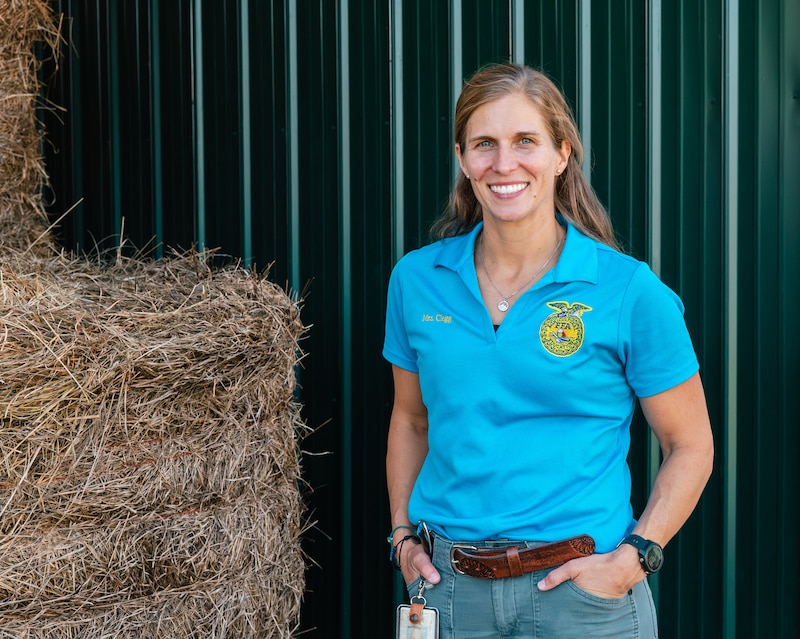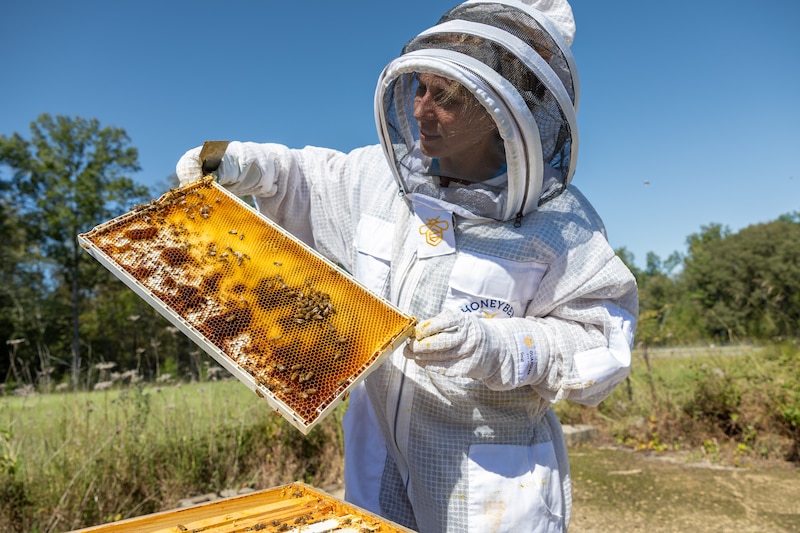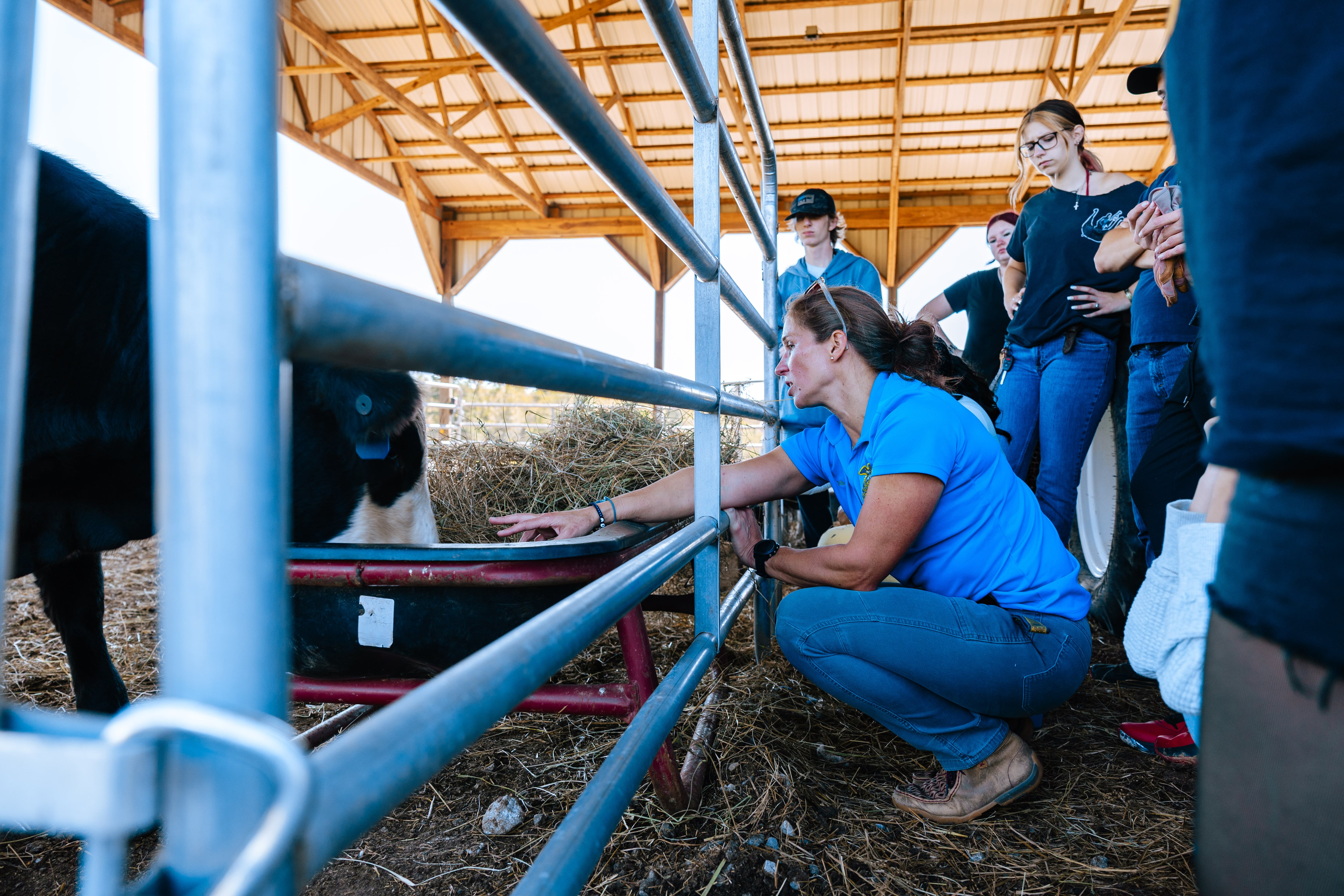Sign up for Chalkbeat’s free monthly newsletter How I Teach to get inspiration, news, and advice for — and from — educators.
While growing up on a livestock production farm in Arkansas, Megan Clegg probably couldn’t imagine how her upbringing would translate into a career years later.
She first used her degree in agriculture to work in veterinary science while she coached competitive gymnastics, before she dipped her toes into substitute teaching at Northwest High School, located in northwest Clarksville, Tennessee.
After an administrator encouraged her to become a certified teacher, Clegg realized she was qualified for a transitional license to teach students the subject she’d been steeped in her entire life.
“As a teenager, I was an avid 4H member and always wished that my high school had an agriculture program so I could have been a Future Farmers of America member,” Clegg said. “There is a lot of irony in me becoming an agriculture teacher. I am blessed to give students something that I always wanted when I was their age.”
After 14 years at Northwest, Clegg has helped build a robust agriculture program, imparting her passion for sustainability not just inside the classroom but by developing a school farm.

Clegg draws on her background in vet science to teach Clarksville teens animal husbandry, working with sheep and cattle, while classes also help maintain school bee hives. Students also take on the responsibilities of caretaking land and animals, repairing fences and managing groundskeeping.
“The farm idea all started because I was asking for permission to keep a few animals on the school campus,” Clegg said.
The farm has helped teach hard work and discipline, Clegg said, in addition to showing students school beyond a desk.
Though Montgomery County was once a rural area of Tennessee, Clarksville has risen as one of the fastest growing and rapidly developing cities in the state. As farmland dwindles in the area, Clegg is even more committed to spark a connection between the land and her students.
“People need to understand and know where their food is coming from for agriculture to be protected and live on to future generations,” Clegg said.
This interview has been lightly edited for length and clarity.
What is your favorite agriculture lesson to teach, and why?
Animal husbandry lessons are my favorite to teach. The basic care and reproduction of animals are essential to successful agriculture, and these are the lessons that usually intrigue the students the most. I also think I enjoy these lessons the most because they link to my personal experience of growing up on a farm and working at a veterinary clinic. The class discussions and student questions during these lessons are exciting as an educator.
What other topics/lessons does Northwest’s agriculture program include, and why do you think it is an important offering for high schoolers?
My fourth-year course includes the opportunity for students to obtain an industry certification in animal science along with hands-on experience working on the school’s farm. These seniors get a taste of what it is to work on a farm and with livestock. The students spend time with the show lambs and cattle, checking the health of the bee hives, building and maintaining fences, and basic groundskeeping.
Many of these students plan to work in an animal field upon graduating high school and this course is a resume builder. Time spent on the farm makes these students more marketable in any applicant pool.

Do you have a memorable teaching moment where you saw a student really connect with the subject or build a relationship with agriculture outside of the classroom?
Since my time at Northwest, the agriculture department along with the help of wonderful community members have developed a school farm. One of the opportunities that the farm has provided is the development of a livestock show team. We participate in local livestock shows, and the farm provides a place for students to house and train their animals to prepare for the shows.
This has provided opportunities to many of the students but one student particular stands out. This young man came into my class with no agriculture experience or connection. In the three years that I had him in class, he went from a very reserved student to the kid in the show ring, showing livestock animals with confidence.
He learned so much from the show team program. His mother even shared that she was no longer concerned about sending him off to college because his level of responsibility had grown so much from being a part of the show team.
Your school is in a once rural area of Clarksville. Do you feel the location and community affects what and how you teach agriculture lessons, and vice versa?
Clarksville is growing faster and faster, and a lot of the farmland is being developed into homes. I do not have many students who are directly connected to agriculture, which is why I feel the importance of my job is growing. The further students are removed from the origin of their food source, the more that they need to be educated on agriculture.
The community I teach in is very supportive of our agriculture program and have shown a lot of support to help us grow. They have been instrumental to the development of the school farm and livestock show team. My senior level students utilize the farm almost daily during the school day. The farm has allowed for my students to have more hands-on learning opportunities.
What’s the best advice you’ve ever received, and how do you put it into practice at work?
Without counsel plans fail, but with many advisers they succeed, from Proverbs. I strive to have a growth mindset and remember to reach out for advice and help no matter how small or large the project or situation. It is a blessing that the agriculture community in my area is made up of some of the best people I know, and they are all willing to share their expertise with me. The district that I teach in is also a wonderful network of support to reach out and seek wise counsel.
What advice would you give other teachers interested in incorporating sustainability and agriculture lessons in their work?
I advise other teachers to network within their local agriculture community. Working with local agriculturists has been one of the smartest things that I have done to help students make connections with agriculture and sustainability. One activity that I started a few years ago with my older students is a farm tour series. We visit local farms and agriculture businesses and hear how agriculture is working within our community both on a large scale and small scale. These visits really show the students the opportunities that are here locally for them to enter the field of agriculture.
If you have a student who comes into the class disinterested in agriculture, how do you help them connect with the material?
I start with getting to know them as a person and find out their interests. Usually from there, I am able to find a connection between what they like or plan to do in the future to agriculture. Agriculture is everywhere and most people do not realize these connections. And if that fails, I have still developed a relationship with the student and then they tend to at least start to see and understand the value and importance of agriculture. If they can grasp that it is important to their future, even if they do not want to go into the industry, they become a more willing participant in the learning.
Melissa Brown is the bureau chief for Chalkbeat Tennessee. Contact Melissa at mbrown@chalkbeat.org.








